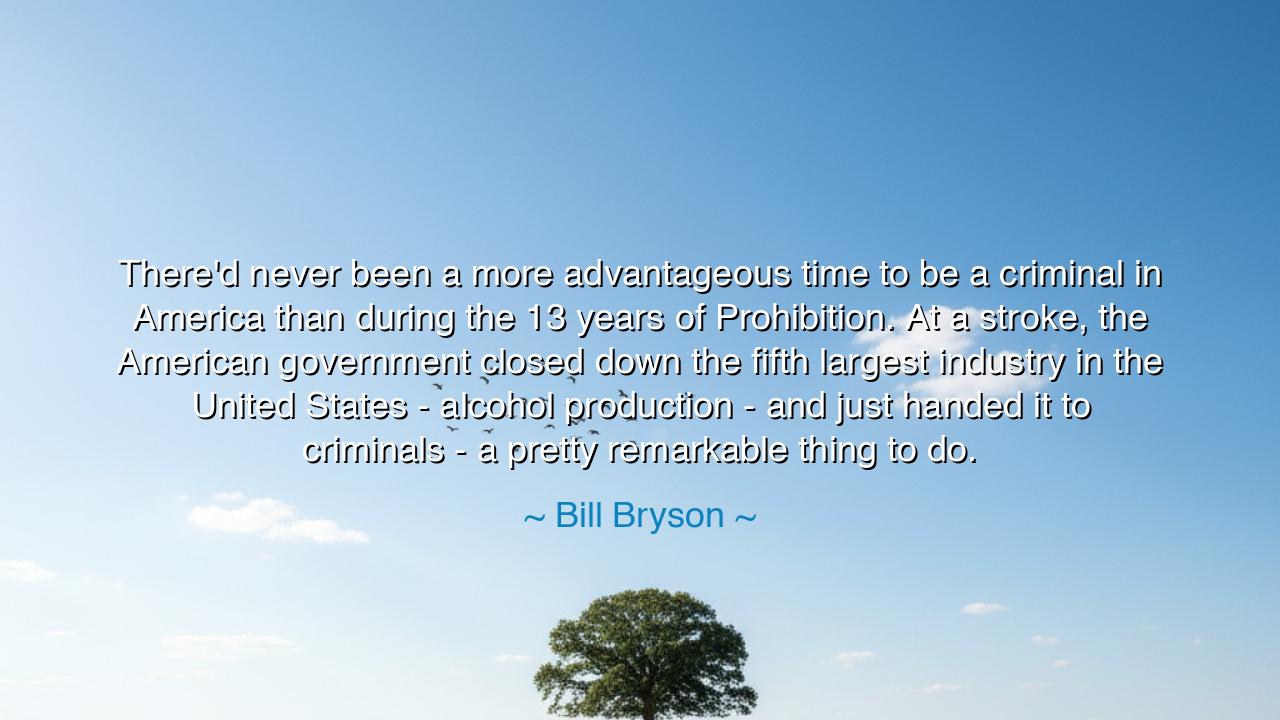
There'd never been a more advantageous time to be a criminal in
There'd never been a more advantageous time to be a criminal in America than during the 13 years of Prohibition. At a stroke, the American government closed down the fifth largest industry in the United States - alcohol production - and just handed it to criminals - a pretty remarkable thing to do.






The words of Bill Bryson — “There'd never been a more advantageous time to be a criminal in America than during the 13 years of Prohibition. At a stroke, the American government closed down the fifth largest industry in the United States — alcohol production — and just handed it to criminals — a pretty remarkable thing to do.” — echo like a lament and a lesson, carved in irony and insight. In these lines, Bryson, the historian and storyteller of modern civilization, reveals the paradox of Prohibition — that a law meant to purify a nation’s soul instead enriched its outlaws, and that moral zeal, when blind to human nature, breeds the very corruption it seeks to destroy. His words remind us that virtue without wisdom becomes folly, and that governments, in their rush to enforce righteousness, must first understand the hearts of the people they would govern.
The origin of the quote lies in Bryson’s reflections on the American experiment of the early twentieth century, that extraordinary period from 1920 to 1933, when the United States outlawed the manufacture, sale, and transport of alcohol. Born from decades of temperance movements and moral crusades, Prohibition was meant to uplift society — to end drunkenness, reduce crime, and restore the nation’s virtue. But what it achieved was the opposite: it transformed vice into empire, turning taverns into underground speakeasies and common men into smugglers and gangsters. The government, in banning one of its largest lawful industries, did not eliminate alcohol; it transferred its power from honest labor to organized crime.
Bryson’s observation cuts to the heart of the tragedy: in one instant — “at a stroke,” as he says — the American state crippled legitimate enterprise and created a black market of staggering wealth. This was not the work of foreign invaders or revolutionaries, but the unintended consequence of moral absolutism. When men are forbidden to drink, they do not cease to desire it; they simply turn to those willing to defy the law. Thus, the law itself became the midwife of crime. Bootleggers, racketeers, and mob bosses — figures once confined to the shadows — rose to power as the new princes of the underworld. Among them, the name of Al Capone became legend: a man who built an empire of violence and profit upon the ruins of misplaced virtue.
The irony, as Bryson reminds us, is that Prohibition did not only enrich criminals — it corrupted the government itself. Police officers, judges, and politicians were drawn into the web of bribery and hypocrisy. The guardians of the law became its violators; the enforcers of morality became its betrayers. The line between good and evil blurred, and the nation learned a bitter truth: that laws cannot make men moral, only more secretive in their sin. As corruption spread from taverns to city halls, the noble experiment became a national farce. Crime soared, respect for authority withered, and a once-proud republic found itself humbled by its own folly.
Yet even in failure, there was wisdom. Prohibition revealed the eternal law of human nature: that virtue cannot be imposed by force, and that no society can legislate away desire. The more rigid the decree, the greater the rebellion it inspires. Freedom, even when misused, is more powerful than control. America’s attempt to purify itself through prohibition was an act of idealism untempered by understanding — a lesson written not in ink but in blood and whiskey. When the experiment finally ended in 1933 with the repeal of the Eighteenth Amendment, the nation did not merely restore its right to drink; it reclaimed its faith in moderation, realism, and liberty.
From the ancient empires to modern democracies, the same pattern endures. The Romans once outlawed certain luxuries to preserve virtue, only to drive indulgence underground. The Church in the Middle Ages forbade knowledge in the name of faith, only to strengthen the hunger for truth. And in every age, when governments seek to dictate morality through fear, they awaken the defiance of the human spirit. As Bryson’s words remind us, the state must not try to be the conscience of its people — for when law replaces wisdom, the righteous become tyrants, and the wicked become kings.
So let this be the teaching, passed from that turbulent chapter of history to all who would shape nations or judge men: laws must align with human nature, or they will be broken by it. A just society governs through understanding, not coercion; through example, not decree. Let every reform be guided not by zeal, but by humility — not by the illusion that man can be perfected, but by the wisdom that he can be guided. The lesson of Prohibition, like all great lessons of history, is this: that freedom, tempered by responsibility, is the truest path to virtue.
And thus, remember Bryson’s enduring truth: when governments mistake control for morality, they become the authors of their own undoing. The wise ruler does not hand the power of the people to criminals, nor the conscience of the people to law. For no man — and no state — can purify a nation by decree. Only when law and liberty walk hand in hand does a people truly govern itself.






AAdministratorAdministrator
Welcome, honored guests. Please leave a comment, we will respond soon